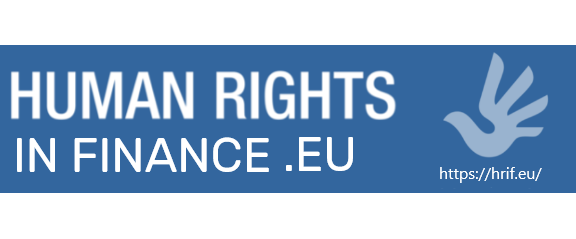
Financial institutions need to respect en promote the proper application of fundamental human rights. We all agree on that.
But when we hear financial institutions explaining that they abide with the UN Guiding Principles for Business and Human rights (UNGPs) in the context of the finance sector, they mostly mean to say they will check whether their financial products do not cause harm to the environment or human labour relations.
Financial institutions (and similarly regulation non-financial institutions that need to comply with the cluster of Anti-Money Laundering, Anti-terrorist finance measures etc) have a rather big blind spot for direct human rights infringements that are a part of everydays finance business: the continuous monitoring of all transactions in their systems and the reporting of many of those transactions without any suspicion of real crime being present and without due process and recognition of the privacy and innocence of their users.
This monitoring may lead to consumers and companies being denied acces to their own funds and being denied their ownership of property rights to the financial claims that they wish to transfer. It also leads to an a priori exclusion of so called ‘high-risk’ categories of consumers or companies, which categorisation in itself is discriminatory in nature and excludes significant groups of users and companies from the financial system.
Although the UN Guiding Principles also cover such direct impacts, most policy makers view the exclusion, monitoring and denial of the execution of private transactions as an unintended but legitimate consequence of financial sector anti-money laundering regulation. Human Rights in Finance (HRIF.EU) sees this behaviour of financial institutions as a fundamental ongoing hidden violation of human rights that has creeped into the financial sector as a bad habit, akin to smoking. It is bad for the health of our financial system. We seek to protect those human rights and prevent damages done to individuals/companies by intervening pro-actively, before the apparent violations will have their effects.
HRIF.EU seeks to educate the public, financial institutions, regulators and supervisors on the need to recognize and stop these habitual mass scale human rights violations that happen in the name of generic policy objectives such as the fight against money laundering. It seeks to prevent the occurance of damages in the form of exclusion of financial services, (temporary) loss of ownership of funds and disproportionate disclosue of private details to jurisdictions where the data protection is at a lower level than in the EU (and where usual data protection rights are absent).
We see that over the last 20 years the assumed constitutionality and consistency test for regulations and national laws has turned out to be a paper based theoretic principle. The consequence is that affected citizens, companies and lawyers/compliance experts are facing an a priori inconsistent legal framework and infringements of human rights by default. They will then have to make a Salomon’s choice which law not to obey and can only hope to correct the issues with law suits after the fact. But in particular when privacy breaches are involved, there is no way to unsee the seen and to undo a privacy violation. HRIF.EU thus wishes to ensure that courts, lawmakers and public demand that financial/supervised/regulated institutions and supervisors redesign their laws and work procedures to ensure an a priori protection of the fundamental human rights that are at stake.
Among those human rights are, the right to privacy, the right to be innocent until proven guilty, the right to enjoy ownership of your own goods and the right to participate and contribute in society (by means of ready access to the financial system).
HRIF.EU is a foundation that represent consumers, companies in order to protect the fundamental human rights interests that are at stake and to prevent damages occuring due to a priori infringements of those rights which are commonplace in excessive monitoring and data retention/distribution requirements introduced by law makers.
We focus on dissemination of information, creating awareness and advocacy efforts (including legal challenges, law suits etc) that seek to protect fundamental human rights such as privacy, innocence presumption, inclusivity, the right not to bo discriminated against, freedom of enterprise (etc). We seek to prevent damages resulting from the infringments of those rights in legislation of any kind or in infringments via actual actions of governments and companies that engage in monitoring, controlling and retaining personal data. The aim is to ensure the well protected and not unduly hindered private participation of each citizen of this planet in fundamental value/ownership transfer and financial activities and transer/ownerships of his/her assets.